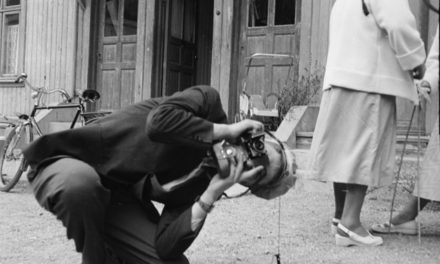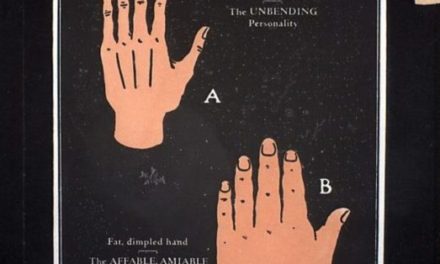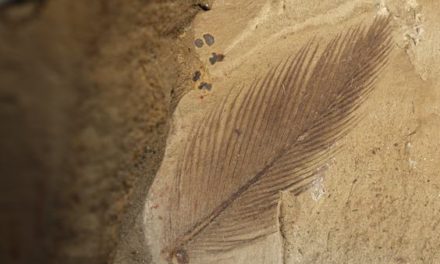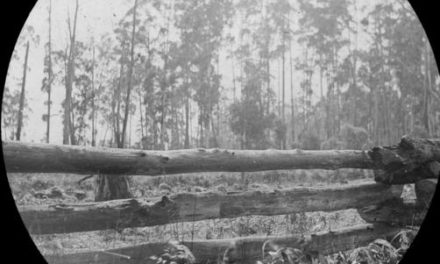Woman in Ice Cave. circa 1900, Museums Victoria, Melbourne.
The Sugar Castle
by Rosaleen Bertolino
Christmas Eve afternoon. Tish is strolling the frozen shoreline of Lake Michigan with her brother, Brady. The sky is blue and white, the lake a darker blue, the ice boulders offshore wheeze and shift. Already Brady sounds homesick, and he’s just flown in. He’s telling her about the annual holiday parade in Panama City. “. . . Horses with pom-poms. A float with the Holy Family and live sheep. You should see it.”
“I’d love to,” she says, trying not to sound too eager. She practically begged him to spend Christmas with her. She’s never been to Panama, although he’s lived there for ten years. Whenever she’s actually had the time and money to visit Brady, those times have always been inconvenient for him, too busy with work, or traveling for his consulting business. Even now she can’t quite believe he’s here, her elusive older brother, sixty years old and still wearing his hair, now thin and gray, tied back in a short ponytail. The ponytail is a mistake, she thinks, but his skin looks tan and healthy. Does she, at fifty-four, look as good for her age? She doubts it. She’s had a difficult year and isn’t sure when it will get better.
Their shoes crunch along the rocky beach. A breeze stings their cheeks. At last they reach a good view of the lighthouse—so thickly coated in sparkling white ice, so spangled with crystalline lumps and swirls that it looks like a castle out of a fairytale.
“Spectacular!” Brady says. He gets out his phone and takes pictures, including one of her in which the lighthouse appears to be rising out of her head like a crown. Clever, except that her chin appears huge, her eyes small and squinty, her cheeks rough red. She knows better than to say these things to Brady, though.
She tells him, “You’ll have to come back this summer. Although it’s not nearly so impressive without the ice.”
He nods cryptically, skids a little in his inappropriate shoes, black boots without much of a tread, and rubs his gloved hands together. “Ready for a drink?” His nose is dripping and his breath comes out in white puffs.
“Why not,” Tish says, more enthusiastically than she feels. Her knees are stiff and she feels a headache coming on, probably her Lyme disease flaring up, but, amazed and grateful that he’s come all this way, is determined to show him a good time
In that spirit, two months ago she’d reserved adjoining rooms at this shingled lakeside resort. Her own house is only a couple of hours away but spending the holidays there after her husband, Matt, moved out seems unbearable. The house has a stifled, haunted feeling, as though someone died.
Tish likes the grand swags of pine boughs and holly that loop through the hotel lobby. And though Brady laughs at its bar, which is posing as a wealthy hunter’s library—mounted elk heads, an enormous chandelier of antlers, vast shelves of brown and red leather-bound books, books that are probably fake—she can tell he secretly likes it. They sit near the cavernous fireplace, sinking deep into big soft chairs, drinks in hand, feet stretched toward the fire. From the dining room, they can hear a large group laughing and popping open Christmas crackers.
Tish’s eggnog is heavy on the bourbon. Halfway thru the sweet, strong drink her resolve not to bring up anything unpleasant melts completely away.
“Why do you think he left me?” she asks.
“He’s an asshole.” Brady says the same thing every time, a protective-brother reflex and thus almost meaningless.
But Tish feels entitled to some male secrets, feels that her brother owes it to her, a matter of karma, having left many women himself. “Please, there has to be more to it than that.” She leans forward, attempting a smile.
He stands up. “I’m getting another drink. Would you like one?”
“No, thank you.” She shouldn’t be drinking at all; alcohol exacerbates her symptoms. But if one can’t indulge a little on Christmas Eve, what’s the point? She watches Brady sidle up to the bartender, a bottle-blonde in a crisp, white shirt.
Matt moved out in August—no longer in love with her, he’d said, this man she’d expected to spend the rest of her life with. At first she’d put Matt’s departure down to his chronic depression; he’d always been a negative thinker. She was upset, of course, but confidently predicted to all her friends that eventually he would come back, and believed it herself.
By September he was living with the girlfriend. That was when she cracked, a crack that ran the length of her body. It felt as if the tiniest injury, something that wouldn’t affect a normal person, would split her in two, kill her. Worse, she was that age when women become invisible to men. On the subway, in the grocery store, everywhere she went, unseeing males bumped into her, sometimes but not always muttered a hasty, ‘excuse me,’ rushed on. For all the recognition in their eyes, she might have been a block of wood.
At work she was just going through the motions. Several times recently she’d made bad mistakes, the hospital administrator pulling her aside, asking her if she wanted some time off. She’d said no, which was a lie, because she couldn’t afford to be seen as weak. She refused to give Matt the satisfaction of knowing that he’d ruined her life.
She went twice weekly to a marriage counselor, alone, because Matt declined her invitation to conduct a post-mortem. She interviewed friends for clues as if they were potential witnesses in a lawsuit. Two women in her chronic illness survivor’s group thought that her husband had left because Tish’s Lyme disease was more than he’d been prepared to handle, men being inherently selfish. It had happened to other women they knew.
The holidays this year feel like an ordeal, a reminder that now, except for Brady, she’s alone in the world: no children, her parents dead. Her eyes water. Ashamed, she wipes her eyes, glances self-consciously around. But except for her and Brady and the female bartender, the room is empty, and Brady and the bartender are deep in conversation. Her brother, the flirt.
Count to ten, focus on your breath, advises her marriage counselor. Count to ten and then begin again, and again. This is how you get through pain.
She remembers how distressed she’d been, last spring, when Matt told her that he was going to visit his sister, who was battling cancer, and how he thought it was best if he went alone because she and the sister did not get along. He hoped she’d understand. But Tish did not; she absolutely must go with him—she was his wife, wasn’t she? Wasn’t she there to support him in all things? She began to cry, until at last he relented. After all the drama, the visit to his sister had gone rather well—she’d thought so at the time, at least. She wonders now if perhaps he hadn’t. Perhaps even then he’d intended to meet the girlfriend somewhere.
Brady comes back with a glass of Scotch and, ignoring her wishes, another eggnog for her.
“On the house,” he says.
“I really shouldn’t drink.”
“Your funeral,” he says, settling back into his chair.
Tears spring out again. “Don’t mind me,” she says, swiping at her eyes with the drink napkin.
Brady nods and looks away. He sips his Scotch.
She doesn’t enjoy crying, no matter what Matt claimed.
“You’re manipulative,” he’d shouted during their last fight. “Whenever you’re losing, you cry and I’m forced to give in.” His cruel words had only made her cry harder, alone in the dark house because he’d already slammed out the door.
She begins to drink the second eggnog. She’s always felt things strongly. As a child, there’d been a song, “Puff, the Magic Dragon,” that could reliably make her sob within a few notes. When Brady’s friends were over, he would play the record, then punch their arms, saying, “You owe me a dollar,” as Tish wept. Brady was no longer so cruelly opportunistic, but perhaps even now he thought frequent tears reason enough to leave a woman.
“Are you hungry?” Brady asks her.
“Not really.”
“Let’s just have a little snack here in the bar then,” he says. “I’ll see what I can arrange.” He goes back over to the bartender, who looks at him eagerly. Even from here Tish can see that.
“Nice place,” Brady says, settling himself back in his chair. “Good job, sis.”
The fire sparks and crackles. Hidden speakers play Christmas carols. Mellowed by his second Scotch, Brady says, “I almost cancelled this trip,” and even though what he says isn’t unexpected, her heart breaks a little. Perhaps it’s the six years’ age difference, but he’s always been more important to her than she is to him.
A waiter arrives with two bowls of cheese soup.
She isn’t hungry, but the warm soup is comforting and before she knows it, she’s finished the bowl. She’s sleepy, contented, a little tipsy. Ready to talk with her brother, about anything really, but mostly about how strange it is that they’re both grieving the ends of relationships. Brady’s much younger girlfriend has dumped him, the first time Tish has known that to happen (Brady inevitably tires of his partners first).
“There’s an incredible soup called Sancocho in Panama,” Brady says. “It’s made with chicken and yucca root.”
“Yum,” she says. “Do you miss her?”
“What do you mean?”
“Alicia?”
His eyes hood over. He yawns. “Sometimes. Time to hit the hay?”
“All right,” she says. She’s gone too far, she thinks; he doesn’t want to talk about Alicia. Then he yawns again and she thinks, he’s flown a long way today, maybe he’s just tired.
In her room, Tish curls up on her side and hugs a pillow to her chest. She still isn’t used to sleeping alone. It helps when the bed isn’t her bed; it helps when the bed is as lovely as this one, with its thick mattress and perfectly smooth sheets. But it’s not easy falling asleep. She wonders how things would have turned out if Matt had been willing to discuss their marriage like a responsible adult. She wonders how things would be if he’d decided not to leave her after all. Or if he’d changed his mind, and come back. Would she ever be able to trust him again? Probably not.
In the first weeks, she actually went out and bought a gun. If he’d been foolish enough to show up at the house with the girlfriend, she might have killed them both. Or waved the gun around at least: ordered them off her property. She liked the feel of the cold, heavy metal, of its power. Several times she’d pressed the muzzle to her cheek. The gun gave her options that she didn’t have before.
Now tossing and turning, attempting to resist what has been her nightly habit for months, she gets out of bed, opens her suitcase, and takes out the gun. She gets back into bed, and falls asleep holding its comforting weight. Protection, even though it’s not loaded.
Morning. Tish feels a queasy hopefulness—it’s always been like this for her on Christmas, wanting the day to be perfect. She has put the gun away, locked her suitcase, taken a shower. They’d agreed to have breakfast together, but Brady doesn’t answer when she knocks on his door, not even after she knocks again, louder. Earlier, she’d heard noises coming from his room, moaning or snoring, she couldn’t tell which, and now she feels a slight panic—what if he’s dead? Her brother strikes her as someone who would die without warning.
She gets out her phone and sends him a cautious text: “Ready for breakfast?”
“No,” he replies, almost immediately.
Tish doesn’t want to eat alone on Christmas morning. Even room service. “Later then?”
“Yes.”
“When?”
“I’ll call you.”
She returns to her room, attempts to read a book, but it doesn’t keep her interest. She hears his door creak, opens hers, and sees the bartender from last night slipping out of his room. The woman, her white shirt wrinkled, walks rapidly toward the elevator. She doesn’t acknowledge Tish. Possibly she’s ashamed, or perhaps she doesn’t consider Tish someone worth acknowledging. Tish thinks about wishing her a Merry Christmas, but settles for a long stare instead, feeling vaguely triumphant when the woman doesn’t meet her eyes.
She shouldn’t be surprised. Brady claiming to be tired last night—it’s obvious now that he was tired only of her company. After he’d walked her to her room, he must have gone back to the bar.
Tish counts her breaths, one to ten. She feels a sudden, desperate need to get outside. She’ll go for a walk along the lake.
In the lobby, she sees the large family from yesterday making their way to the dining room, the grandparents handsome and white-haired, the father staggering under a stack of presents. She’s offended by their ostentatious happiness. Shouldn’t a resort such as this be a refuge for those who have nowhere else to go for the holidays? Couples trying to mend things, for instance, or small, quiet groups of friends. Orphans. Divorcees.
As she steps outside, the reflection of sunlight on snow momentarily blinds her. She stops, closes her eyes. When she opens them again, there’s the ice-coated lighthouse shimmering in the distance like a mirage. Along the main walkway, icicles hang, enormous fangs. She breaks off a tooth. Even through thick mittens, she feels its cold sting.
She and Brady grew up where winter was a frost that made the lawn crunchy, nothing like Minnesota where the air gets so cold that you could kill yourself simply by undressing. Thirty years ago, she’d come to Milwaukee for a nursing job, never intending to stay. Then she’d met Matt. She has no reason to remain in this Nordic climate now, no reason except for her job at the hospital, which she’s sick to death of. Head of nursing is not what it sounds. She spends all day buried in paperwork. What if she quit her job and moved to Panama? She wishes Brady would invite her, not just to visit but to stay, but she’s certain it would never occur to him. Perhaps he doesn’t want his younger sister nearby. And yet the two of them have no other family in the world.
An ice fisherman walks past her, bulky, red-faced, lugging a fishing pole, an axe, a bucket. They’re everywhere this time of year. She herself can’t imagine a more unpleasant activity. Imagine sitting on a downturned bucket in the icy cold. “Merry Christmas!” he says, winking.
“Same to you.”
“Care to join me on the ice?”
She smiles, shakes her head. Probably he’s been drinking. Besides, she’s finished with Midwestern men, so seemingly untroubled, while deep inside their corn-fed chests resentments multiply, nourished by suppression.
“When we got married, you wouldn’t even let me keep my cat,” Matt claimed before he left, as if she were heartless, and not, as he well knew, allergic to fur. Perhaps he’d conveniently forgotten, the better to turn her into the bad guy.
From her coat pocket, her phone vibrates. A text from Brady: “Where are you?”
She can’t type with mittens on, and it’s too cold to take them off.
She hurries back, arriving out of breath, her heart pounding, wondering why she feels the need to rush. Does she really think he’ll find time to bed the bartender again? Or find some other way to disappear? She does.
She tears off her mittens in the lobby and texts him back. “I’m here.”
He’s already in the dining room, his hair damp from a shower. He’s unapologetic about making her wait earlier, while she stammers, “I didn’t think you’d get up for a while.”
“Not to worry,” he says, regally.
As they wait for their breakfast to arrive, they exchange presents. He gives her a silky pink scarf, professionally wrapped, which she guesses he bought at the airport. Tish, on the other hand, searched for and found his present months ago, a rare book of old maps of Central America. She smiles to conceal her disappointment in the scarf, pleased to see how pleased he is by the book. It’s often this way between them: his older-brother love erratic and careless, and hers unwavering, worshipful.
Brady finds a map of Panama. He laughs. “Drawn before we were sliced in two.”
“What?”
“The canal,” he says. “Right here is Isla Contadora. Come visit and I’ll teach you to dive.”
Brady can be so charming.
Tish wants to say, I’ll be out on the next plane, but isn’t sure he means this invitation. There’s an invisible fortress around him, which she thinks is his way of protecting her, or perhaps himself, as if she were still a child and not a woman in her fifties.
Their waiter, an indifferent young man in a green and red bowtie, brings their breakfast. Steak and eggs for Brady; scrambled eggs and toast for her. Tish is slightly queasy and wishes she’d just ordered the toast.
Brady bends over his plate and saws at the meat. Shoves a chunk in his mouth, swallowing rapidly. Disgusting, the way he shovels in food like a cave man. And has sex like a cave man, too, with whoever comes along.
“So you miss Alicia?” she says, barely bothering to conceal her anger. “Is that why you slept with the bartender?”
Brady’s open mouth reveals a cud of meat on his tongue; his eyes are unreadable. His cheeks swell; he’s going to spit the half-chewed mouthful straight at her. But he swallows and grins. “Miss Prissy. Did you know you have crumbs all over yourself?”
She looks down at her black sweater. “Oh my God.”
Suddenly they begin laughing, helplessly, Tish snickering, Brady hee-hawing, the way they had as kids when something embarrassing struck them as hilarious. The other diners are looking their way, some smiling, others perplexed and disapproving, which only makes them laugh harder.
At last, they calm down. Wipe their eyes.
“You mentioned a sleigh ride,” Brady says, leaning back in his chair, his hands folded over his small, soft gut. “What do you think?”
The sleigh ride is a bone he’s tossing her, because he didn’t seem interested when she suggested it yesterday. But so what—of course, she wants to go.
Thick wool blankets across their laps, the horse’s breath steaming, grainy clopping of hooves along the beach, the coachman with his top hat and black cape—at last it feels to her like Christmas.
Brady looks tired. Of course, he didn’t get any sleep. Too busy.
They pass children industriously building a family out of snow. The snow father has a baseball cap, the snow mother is wearing a brassiere.
Brady laughs.
“Do you ever wish you’d had children?” Tish asks, whispering because she doesn’t want the coachman to hear.
“No! Do you?”
“I didn’t used to. But I hate being alone.”
“You have me,” he says gallantly, wrapping an arm around her shoulders.
“Don’t you mind being alone?”
“I’m happier alone.”
This is why they will never understand one another. She wishes she could learn to make her heart as cool as his.
“You’re a good person, Tish,” Brady says. “You always do the right thing, even when it’s hard. I couldn’t ask to be related to a nicer person.”
“Thank you,” she says, as if what he’s saying is true. He has no idea of all the bitterness she holds inside, swaddled by her soft voice, her even temper—and how badly she’d like to find a way to safely let it out.
They reach a good view of the lighthouse. It’s as beautiful as yesterday, the frozen snow sparkling like sugar. There’s a fairytale Tish suddenly remembers—one with a sleigh—about a little boy who gets a splinter of ice in his heart and goes off to live with the evil Snow Queen. His sister must save him, at least that’s how she remembers it, but how she manages it she can’t recall. The sleigh slides along behind the steady gray horse. After the ride, they might nap or play cards. Later, Brady might vanish to his room with the bartender again, while she lies alone in her room with an unloaded gun.






